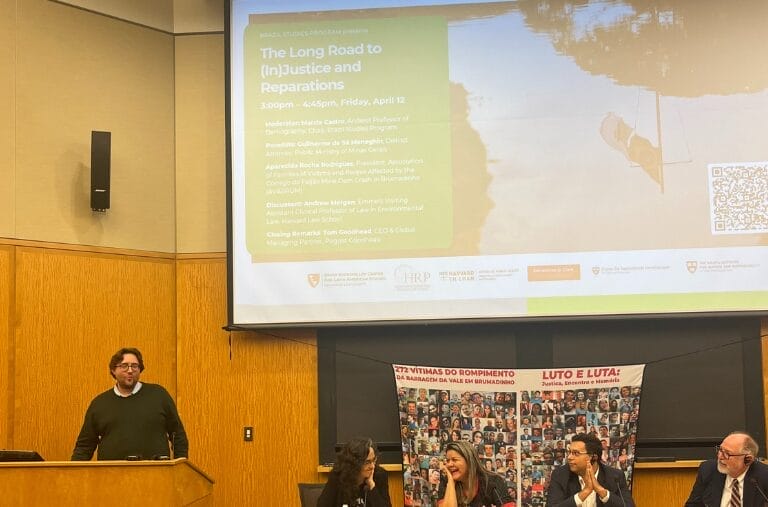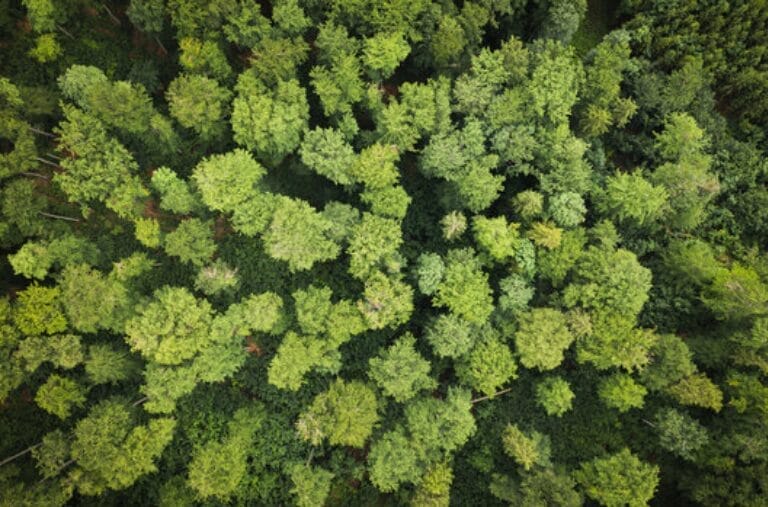This month, our CEO and Global Managing Partner Tom Goodhead joined experts and victims of environmental crimes in Brazil at Harvard University.
The panel discussed:
- the growing threat from the extractive industries
- how to tackle it
- the importance of reparations for affected communities.
Below are Tom’s remarks.
Tom Goodhead on the extractive industry
Unfortunately, there is no shortage of examples of powerful companies in the extractive industries, pursuing economic progress, at great cost to human health, the protection of communities and the environment.
At Pogust Goodhead, my team and I work on many cases concerning the extractive industries in Brazil and across Latin America.
Our largest case is the collapse of the Fundão dam in Mariana, Brazil. The dam was operated by Samarco, a joint venture owned by Australian mining company, BHP and Brazilian firm, Vale.
It is described by many as Brazil’s worst ever environmental disaster. In 2015, over 50 million cubic meters of toxic tailings were dumped into the Rio Doce. The disaster killed 19 people and affected the lives of hundreds of thousands more. Toxic mud, containing heavy metals and arsenic, traveled a total distance of 700km. It destroyed much of what was in its wake and covered an area the size of Portugal.
Since 2018, we have been leading the largest opt-in group action in history, claiming damages amounting to a staggering USD$44 billion. This is on the behalf of nearly 700,000 Brazilians affected by the disaster. This includes Quilombolas and the Indigenous Krenak, Pataxó, Guarani and Tupiniquim communities.
This claim, which we are bringing in the English courts, is complemented by a two-pronged attack launched this year, against Vale and Samarco in the Netherlands. This is a new and additional claim on the behalf of over 77,000 people, claiming USD$3.8 billion in damages.
Litigating on behalf of affected communities
We are also litigating against German miner, TÜV SÜD over the Brumadinho dam collapse. The disaster claimed the lives of 272 people and released toxic tailings into over 300km of the Paraopeba River.
Also in Brazil, we also represent communities in Barcarena, in the northern state of Pará. Communities are challenging aluminum mining giant, Norsk Hydro, over the ongoing and cumulative impacts of its operations in the region.
Outside of Brazil, in Peru, we are representing thousands of individuals and businesses against Spanish-owned Oil company, Repsol. Repsol is responsible for Peru’s worst ecological disaster in living memory after a major oil spill in 2022. Around 12,000 barrels of oil were dumped into the Pacific Ocean during the offloading of an oil tanker. The spill almost entirely destroyed more than 500 hectares of marine fauna reserves in protected areas. The disaster caused irreparable damage to the area’s unique marine and wildlife. The economic consequences have persisted to this day, with affected areas remaining contaminated and unsafe for humans.

Reparation is an essential part of justice
Justice can mean different things to different people. Truthfully, for people whose families, livelihoods and social fabric have been ripped apart by a preventable, man-made disaster such as a dam collapse or an oil spill, justice refers to much more than financial remuneration.
There can be no price put on the losses suffered by communities like those in Mariana. No amount of money, no commitment to rebuild or reinvest, can be enough to replace the lives lost, nor the rich environmental and cultural heritage that was destroyed.
Amidst this, our legal cases seek to go some of the way in delivering access to justice to those who otherwise would find it difficult, if not impossible, to access redress for what has happened to them.
The importance of litigation
Litigation has become an increasingly powerful tool in encouraging accountability and disincentivising poor corporate behavior.
The truth is that money talks. When it comes to accountability, often the only language that big business speaks is ‘Dollars’. Hitting their bank balance through civil suits is one of the ways – of course, alongside criminal culpability – that we can make companies sit up and listen. It’s one of the ways that my firm and others involved in the growing trend of environmental group litigation, are seeking to deliver justice for people affected by corporate wrongdoing and environmental disasters.
What we’re doing at Pogust Goodhead is bringing the fight to their front doorstep. We are taking them to court in the countries they are headquartered in. So, in the case of BHP and Vale, taking the two-pronged approach of bringing the case both to the English and Dutch courts and in the case of TÜV SÜD, bringing the fight to Germany.
With group litigation, it’s not just about the past, it’s about the future too. The threat of litigation – to the tune of billions of dollars – is just about the most powerful mechanism we have, to compel better governance and behaviors, and it has the potential to dramatically transform the landscape of corporate responsibility.








